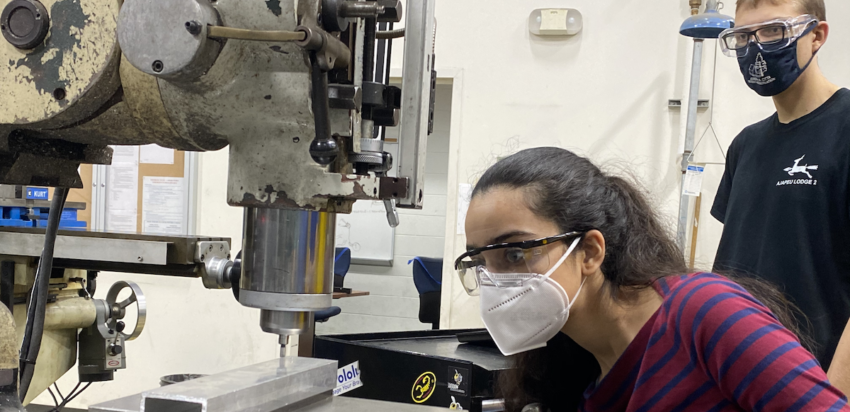by Jonathan Spalten.
In general, each RoboJackets Team is divided up into 3 subteams, organized based on their discipline: mechanical, electrical, and software. This enables the teams to divide and conquer the complex robotics challenges they choose to compete in. As a result, a great deal of knowledge in each discipline is developed on a team-by-team basis, but this can also lead to siloing in teams as they get deeper into their team’s technical challenges. For example, there might be a great deal of similarity between the software approaches of localization and mapping between two teams like RoboRacing and RoboNav, but their software teams might not interact on a regular enough basis to share knowledge. To help address this and create communities focused around each discipline in RoboJackets, we began having biweekly meetings called discipline cores in which representatives from each discipline come together to discuss progress on their projects, share knowledge across the teams’ disciplines, and discuss issues that affect all the subteams of a given discipline, like common resources such as manufacturing equipment.
We reached out to the leaders in charge of organizing and running these discipline core meetings to ask how they work to help break down inter-team silos and for some examples of recent discussions.
First up is the Mechanical Core Chair, Sam Morstein. He placed an emphasis on mech core acting as a “forum where people’s mechanical questions can be answered by members of the other teams in RoboJackets.” To serve that purpose, he strives to ensure every team gets time to discuss their progress and the teams have time to ask questions of the collected mechanical knowledge. The recent discussion he thought was particularly productive was regarding how to train new members on machining under new COVID restrictions, including restricted shop access and social distancing:
Many teams only had a couple people CMA trained with some of those members graduating this year. The discussion mostly involved the teams being aware of what training restrictions were put in place … and then how we would be able to train as many people as possible working around those restrictions. It was productive because not only did everyone come out of the discussion more knowledgeable about how training would work this year, a plan was put in place to get members from all teams trained as much as possible.
Second we have Electrical Core Chair, Arvind Srinivasan. He highlighted what he characterizes as the “logistics” part of the electrical discipline, to “ensure that we continually and promptly buy the shared resources we need and organize [electrical] design reviews so teams can make quick progress on designs.” He also mentioned a couple of RoboJackets projects that affect all electrical teams, including electrical and firmware training and organization of RoboJackets’ electrical room, including our battery storage cabinet. A recent discussion electrical core had that Arvind thought was particularly productive was a mid-semester review:
As a very recent example, we reviewed electrical proposals from each team as a mid semester check and I think that discussion was productive to help identify issues that different teams were having and suggested mitigations.
In particular in their electrical proposal review, Arvind and the electrical core team “wanted teams to avoid short-term progress at the cost of long term success (such as by neglecting helping new members to get other projects done).”
Third, we have the Software Core Chair, Oswin So. Oswin emphasized how the format of software core (IE, primarily progress updates) helps the members involved dig deeper:
By giving teams a chance to go over their progress in-depth, [software core] allows for them to receive feedback about their approaches and technical goals while sharing knowledge among teams. Teams can also discuss the similarities and differences in their approaches to common problems …
Additionally, the meeting can delve into the details simply by “members being interested and wanting to dig deeper into how a particular team tackles a team-specific problem.” All in all, this results “in a thorough analysis of the design decisions and potentially future directions where the currently implemented solution could be improved.” A recent example of a discussion point that Oswin thought was particularly productive was a presentation RoboCup gave in which they detailed their plans to migrate their entire software stack to ROS. He says, “As this was a large change, there were many discussions about why functionality was organized in the way that they were and whether different approaches made more or less sense.”
In any organization that solves varied technical problems, siloing along division lines can be a problem, and RoboJackets wants to avoid this problem by building inter-team communities. Discipline cores are one way RoboJackets does this, and we look forward to continued success in the transfer of knowledge among teams.

